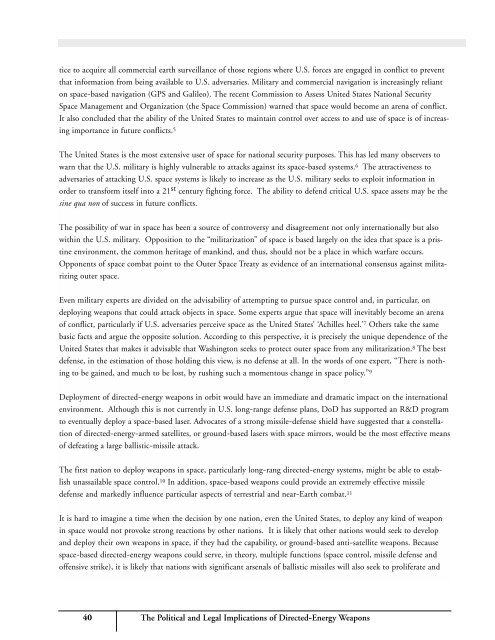directed-energy-weapons
directed-energy-weapons
directed-energy-weapons
Create successful ePaper yourself
Turn your PDF publications into a flip-book with our unique Google optimized e-Paper software.
tice to acquire all commercial earth surveillance of those regions where U.S. forces are engaged in conflict to preventthat information from being available to U.S. adversaries. Military and commercial navigation is increasingly relianton space-based navigation (GPS and Galileo). The recent Commission to Assess United States National SecuritySpace Management and Organization (the Space Commission) warned that space would become an arena of conflict.It also concluded that the ability of the United States to maintain control over access to and use of space is of increasingimportance in future conflicts. 5The United States is the most extensive user of space for national security purposes. This has led many observers towarn that the U.S. military is highly vulnerable to attacks against its space-based systems. 6 The attractiveness toadversaries of attacking U.S. space systems is likely to increase as the U.S. military seeks to exploit information inorder to transform itself into a 21 st century fighting force. The ability to defend critical U.S. space assets may be thesine qua non of success in future conflicts.The possibility of war in space has been a source of controversy and disagreement not only internationally but alsowithin the U.S. military. Opposition to the “militarization” of space is based largely on the idea that space is a pristineenvironment, the common heritage of mankind, and thus, should not be a place in which warfare occurs.Opponents of space combat point to the Outer Space Treaty as evidence of an international consensus against militarizingouter space.Even military experts are divided on the advisability of attempting to pursue space control and, in particular, ondeploying <strong>weapons</strong> that could attack objects in space. Some experts argue that space will inevitably become an arenaof conflict, particularly if U.S. adversaries perceive space as the United States’ ‘Achilles heel.’ 7 Others take the samebasic facts and argue the opposite solution. According to this perspective, it is precisely the unique dependence of theUnited States that makes it advisable that Washington seeks to protect outer space from any militarization. 8 The bestdefense, in the estimation of those holding this view, is no defense at all. In the words of one expert, “There is nothingto be gained, and much to be lost, by rushing such a momentous change in space policy.” 9Deployment of <strong>directed</strong>-<strong>energy</strong> <strong>weapons</strong> in orbit would have an immediate and dramatic impact on the internationalenvironment. Although this is not currently in U.S. long-range defense plans, DoD has supported an R&D programto eventually deploy a space-based laser. Advocates of a strong missile-defense shield have suggested that a constellationof <strong>directed</strong>-<strong>energy</strong>-armed satellites, or ground-based lasers with space mirrors, would be the most effective meansof defeating a large ballistic-missile attack.The first nation to deploy <strong>weapons</strong> in space, particularly long-rang <strong>directed</strong>-<strong>energy</strong> systems, might be able to establishunassailable space control. 10 In addition, space-based <strong>weapons</strong> could provide an extremely effective missiledefense and markedly influence particular aspects of terrestrial and near-Earth combat. 11It is hard to imagine a time when the decision by one nation, even the United States, to deploy any kind of weaponin space would not provoke strong reactions by other nations. It is likely that other nations would seek to developand deploy their own <strong>weapons</strong> in space, if they had the capability, or ground-based anti-satellite <strong>weapons</strong>. Becausespace-based <strong>directed</strong>-<strong>energy</strong> <strong>weapons</strong> could serve, in theory, multiple functions (space control, missile defense andoffensive strike), it is likely that nations with significant arsenals of ballistic missiles will also seek to proliferate and40 The Political and Legal Implications of Directed-Energy Weapons


